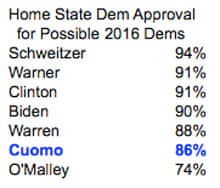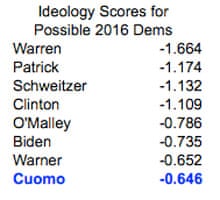It seems unfortunate to say anyone had a "good" superstorm Sandy, when so much damage was done to the US Atlantic coast, but New Jersey Governor Chris Christie and President Barack Obama have both been judged to have benefited politically from their handling of the crisis and the storm's aftermath. New York Mayor Michael Bloomberg slightly less so, but he is nearing the end of his term, whereas the Republican Christie faces re-election next year and possibly harbours presidential ambitions in 2016. But what of New York state's Democratic governor, media darling Andrew Cuomo – who has also been talked of as a potential presidential prospect.
There's no indication at this stage that he would run, but there's already been some wrangling from the left that Cuomo isn't liberal enough for a Democratic primary. My own instinct as a citizen of New York has been to agree, but let's look at the numbers to see what the voters think and what the record says. Would Cuomo be too centrist to win a Democratic presidential primary?
Let's first look to the home state voters of each of the possible candidates in 2012. I've chosen the seven contenders that Public Policy Polling listed in their last 2016 New Hampshire Democratic primary survey: Joe Biden (Delaware), Hillary Clinton (New York), Andrew Cuomo (New York), Martin O'Malley (Maryland), Brian Schweitzer (Montana), Mark Warner (Virginia), and Liz Warren (Massachusetts).
I've gathered the approval (or if unavailable, favorable) ratings of each of these candidates among self-identified Democrats in their home-states. I've distributed undecideds in all cases based on those already with a positive or negative opinion of the candidates.
The idea is try to understand how Democrats in their own states like or dislike their respective putative candidate. If the Democrats who know them best don't think much of them, then it's hard to imagine that other Democrats will. (Note: for Biden and Clinton, I took approval ratings from before their run for federal office in 2008, in order to try to isolate their approval for their jobs representing one state, rather than all states.)
Andrew Cuomo's approval among New York Democrats looks high, yet is actually sixth of seventh among the candidates. Hillary Clinton's approval was 5 points higher among Democrats and Brian Schweitzer is 8 points ahead.

Cuomo's issue is that his high approval, 81%, among the general electorate is actually because he is liked by all members of the electorate. His 86% approval among Democrats is very close to his 76% approval among Republicans. Compare that with someone like Schweitzer, who has only a 30% approval among Republicans, while maintaining a 94% approval among Democrats. Even the relatively disliked Martin O'Malley does far better among Democrats, at 75%, than he does among Republicans, at only 19%.
Lest you think think Cuomo's standing is normal among New York's current state office holders, both Democratic Senators Kirsten Gillibrand and Chuck Schumer sport lower approvals among the general electorate, 75% and 71%, yet have have better approval ratings among Democrats, with 91% and 95% respectively. The reason, again, is that they do better among the Democratic base.
Now, none of this is to say that Cuomo is doing poorly among Democrats. It's just to say that his approval ranking is more tied to overall voter views than to any special bond he has with Democrats.
So, why isn't Cuomo more popular among the Democratic electorate?
Only 22% of Democrats think he's liberal, 15% think he's actually conservative, and 65% peg him as moderate. Those numbers are quite staggering especially in comparison to how voters saw Hillary Clinton before her re-election to the Senate in 2006: 49% of New Yorkers saw her as liberal, 40% as moderate, and 11% as conservative. That's a far wider split than Andrew Cuomo's is currently. With Democrats, 38% thought she was liberal, 16 points ahead of Cuomo.
So, even though he, as governor, orchestrated the political bargaining in Albany that saw New York's state assembly pass historic same-sex marriage legislation last year, Cuomo's not getting credit for it from progressives – who may look more askance at the deals done to win upstate Republican backing for his budget, or may not trust the governor on the pending decision about hydrofracking in New York state. For whatever reason, Cuomo simply doesn't have that liberal allure that Clinton or most popular Democrats have.
Indeed, according to a method developed by Adam Bonica, Cuomo can be viewed as potentially the most conservative candidate in the field. Bonica's method is fairly simple: he looks at a candidate's campaign contributors to map out their ideology. By using members who serve in multiple bodies, this allows for governors to be compared with United States senators. (A score of -2 indicates the most liberal of candidates; 0 indicates middle of the road; and 2 indicates the most conservative.) No system is perfect and there can be differences with other scoring systems, but Bonica checks his method against others to obtain reliable results.

If these numbers are to believed, the possible 2016 roster of candidates will position Cuomo and Warner as ideologically conservative Democrats, Biden and O'Malley as moderate Democrats, Clinton, Patrick, and Schweitzer as liberal Democrats, and Warren as a very liberal Democrat. I find it very surprising that Cuomo scores as more conservative than Mark Warner of Virginia (albeit by a statistically insignificant margin). This is the same Mark Warner who had to claw his way to victory in a 2001 gubernatorial race by portraying himself as a conservative "Nascar Democrat".
Unlike Warner, Cuomo has no reason to be so right-leaning to win elections in the state of New York. Clinton was able to win re-election 2006 by 36 points, despite being plenty to the left of Cuomo. Schweitzer won the 2004 Montana gubernatorial race by 4pt, even as Republican George W Bush won the presidential contest in Montana by over 20pt. You might say Cuomo seems more conservative more out of want than necessity.
Cuomo's score is also far more conservative than the current office holder President Obama. Obama's score of -1.30 is a one whole deviation to the left of Cuomo's. It's difficult for me to believe that a base that nominated Obama could also go for Cuomo.
All these numbers, from approval ratings to Bonica's scores, point to one conclusion: unless Andrew Cuomo dramatically repositions himself for a run for president in 2016, he may not find the liberal wing of his party backs his bid.
